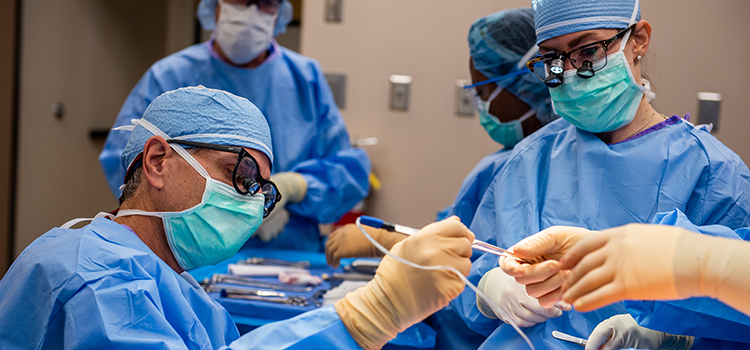The UAB Department of Neurosurgery offers the following fellowships for advanced neurosurgical training. All fellowships are carefully coordinated with the residency training program, in order to ensure a mutually beneficial learning experience.
-
Endovascular Neurosurgery Fellowship
The one-year, CAST-accredited Endoscopic Endovascular Fellowship at the University of Alabama at Birmingham offers comprehensive subspecialty training in endovascular neurosurgery.
Fellows gain hands-on experience with advanced surgical techniques, including diagnostic angiograms, coiling/embolization procedures, and stenting, while working alongside nationally recognized leaders in the field. The program also offers exposure to over 1,000 neurointerventional cases annually, including pediatric procedures.
Fellows will train primarily at UAB under the direction of Mark Harrigan, M.D., with additional training at Children’s of Alabama and the Birmingham VA Medical Center. Fellows will also work with a neuroradiologist.
Responsibilities include, but extend beyond:
- Participate in the full endovascular service
- Manage a clinical service
- Run a weekly neurosurgery clinic
- Mentor neurosurgery residents in and out of the operating room
- Participate in research projects
At the end of the fellowship, a certificate will be issued by the UAB Department of Neurosurgery.
To schedule an interview, please send your CV to mharrigan@uabmc.edu.
-
Pediatric Neurosurgery Fellowship
The one-year, ACPNF-accredited Pediatric Neurosurgery Fellowship at the University of Alabama at Birmingham and Children’s of Alabama offers comprehensive subspecialty training in pediatric neurosurgery. Upon completing the program, fellows are qualified to sit for the American Board of Pediatric Neurological Surgery exam that enables them for board-certification.
Fellows gain hands-on experience with advanced surgical techniques and innovative treatments, working alongside nationally and internationally recognized leaders in the field. The program boasts a 100% board certification success rate, with many alumni advancing to leadership roles at prestigious pediatric medical centers nationwide.
Fellows will train primarily at Children’s of Alabama under the direction of Jeffrey Blount, M.D., MPH.
Responsibilities include, but extend beyond:
- Participate in the full pediatric neurosurgery service
- See patients in a clinical and inpatient setting
- Participate in pediatric neurosurgery conferences
- Mentor neurosurgery residents in and out of the operating room
- Produce at least six to eight manuscripts (typical range of four to 24 papers) for peer reviewed literature in pediatric neurosurgery
To schedule an interview, please send your CV to James Johnston, M.D. - james.johnston@childrensal.org.
-
Radiosurgery Fellowship
The one-year Radiosurgery Fellowship at the University of Alabama at Birmingham offers comprehensive subspecialty training in stereotactic radiosurgery.
Fellows gain hands-on experience with advanced surgical techniques and innovative treatments, working alongside nationally recognized leaders in the field. The program also offers significant exposure to radiation oncology and opportunities for translational and basic science research in radiosurgery-related areas.
Fellows will train primarily at UAB under the direction of Nicole Bentley, M.D.
Responsibilities include, but extend beyond:
- Participate in the adult radiosurgery service
- Participate in pre-radiosurgical decision-making, operative planning, and post-radiosurgical care
- Run a weekly neurosurgery clinic
- Take general neurosurgical call
- Mentor neurosurgery residents in and out of the operating room
- Participate in research projects and submit at least two manuscripts for publication
For application information please contact Nicole Bentley, M.D. - jbentley@uabmc.edu.
-
Stereotactic, Functional and Epilepsy Fellowship
The one-year, CAST-accredited Stereotactic and Functional Neurosurgery Fellowship at the University of Alabama at Birmingham offers comprehensive subspecialty training in functional neurosurgery and epilepsy surgery.
Fellows gain hands-on experience with advanced surgical techniques, including deep brain stimulation, epilepsy surgery and neuromodulation, while working alongside nationally recognized leaders in the field.
UAB is home to the renowned Comprehensive Parkinson's Disease and Movement Disorders Clinic, recognized as one of only nine nationally designated advanced research centers by the American Parkinson’s Disease Association. The center brings together both neurosurgeons and neurologists, with senior faculty members who have authored more than 150 publications in the area of movement disorders.
Fellows train primarily at UAB under the co-direction of Nicole Bentley, M.D., (movement disorders) and Jasmine Thum, M.D., (epilepsy), with additional training at Children’s of Alabama and the Birmingham VA Medical Center.
Responsibilities include, but extend beyond:
- Participate in the adult stereotactic, functional and epilepsy services
- Manage a clinical service
- Run a weekly neurosurgery clinic
- Mentor neurosurgery residents in and out of the operating room
- Participate in research projects
-
Minimally Invasive and Complex Spine Fellowship
The Minimally Invasive and Complex Spine Fellowship at the University of Alabama at Birmingham offers comprehensive subspecialty training in spine surgery.
Fellows gain hands-on experience with advanced surgical techniques and innovative treatments, working alongside nationally and internationally recognized leaders in the field.
Fellows will train primarily at UAB under the direction of Jakub "Jake" Godzik, M.D., MS.
Responsibilities include, but extend beyond:
- Participate in the full spinal neurosurgery service
- See patients in a clinical and inpatient setting
To learn more, please contact: Jakub "Jake" Godzik, M.D., MS - jgodzik@uabmc.edu.
